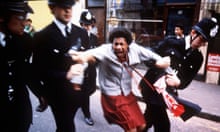The cutting of cane in the Caribbean sun proved crueller than any bonded toil in the US. American slaves would generally live long enough to reproduce, but British slaves on British islands often would not, necessitating continual replenishment from British ships which brought their chained cargo from British outposts in West Africa. Every reflective American is aware that “involuntary servitude” was their country’s original sin, but – as black history month begins in the UK – the very phrase “British slave” still strikes an unfamiliar note.
Nations are, Ernest Renan wrote, defined not only by what they remember, but also what they forget. And, like the outsourced torture of 21st-century America, 18th-century British slavery is easy to put out of mind because it took place far from home. So did the eventual reckoning: unlike the civil rights movement in the US, the anti-imperial struggle unfolded on remote shores. Distance consigns a long history of subjugation to the very margins of the tapestry of Britain’s tale.
Visiting Jamaica on Wednesday, David Cameron sought to brush aside a debate about slavery and reparations in the customary British fashion: by changing the subject. The prime minster was there, he insisted, to talk instead about “the future”. All his recent predecessors would have said something similar. There was a time, however, when the establishment couldn’t deny the transformative wealth that slavery had brought to Britain – because it kept hitting them in the face. It was not only the coffee houses, but also the most ostentatious fortunes of Georgian England that relied upon cruelty in the Caribbean. Visiting Weymouth, George III was miffed to run into the owner of a Jamaican plantation with a glistening carriage whose riders were robed more magnificently than his own: “Sugar?” he jealously barked. “Sugar! Eh?”.
Before dismissing calls for compensation as gesture politics, it is as well to recall that the British state has compensated for slavery before – it is just that it compensated the owners, as opposed to the owned. When parliament broke the legal chains in 1833, it also raised £17bn (in today’s terms) to make good the losses “of human property” of some 46,000 Britons, one of them Mr Cameron’s first cousin, six times removed. Such wealth trickled down the generations, but that is only the most obvious, and not necessarily the most important, part of the slavery inheritance. For Britain, benefits from the triangular trade in human beings on the Atlantic spilled over into industries from ship-building to finance, and spurred the growth of great port cities in Liverpool and Bristol. In the enslaved societies, life without freedom left a very different bequest. Those who had themselves been property had little to pass on. The deeds and the control of local industries and assets often remained with distant colonial masters, who continued to manage things in their own interest. Where to begin in measuring the effect on the child-rearing of parents denied any childhood themselves? How to weigh the loss of the social bonds never formed because association wasn’t free? And how to evaluate the psychological scars left on communities that had endured government by whip?
None of these legacies are easy to quantify, but that doesn’t mean that they don’t exist. Any compensation proposition is inescapably arbitrary – financially arbitrary in the precise sum set, and perhaps morally arbitrary in that it would involve contemporary Britons who have never bought slaves, atoning for long-dead Britons who did. On top of that, there is a sense that any cheque would be in the wrong currency – freedom forgone is simply not convertible into pounds and pence.
All this points away from a once-and-for-all cash settlement, but then that is not the only form of recompense. The living can never be responsible for the evil deeds of the dead, but they can and do profit from them. And that, surely, precludes getting away with the claim that it’s time to “move on”. For a start, there is an onus to rewrite the national story. Politicians who weren’t born when British boots landed on Normandy beaches nonetheless speak of when “we” won the war; the same “we”, the “we” of history, locked men and women in chains. Trade and aid policies should also reflect Britain’s reparative duties. Mr Cameron has a commendable record on development spending, but it is a bitter irony that he is in Kingston to explain how this will be spent on a new jail. Given the history, Britain really ought to have come up with a better way to unlock a brighter Jamaican future.








